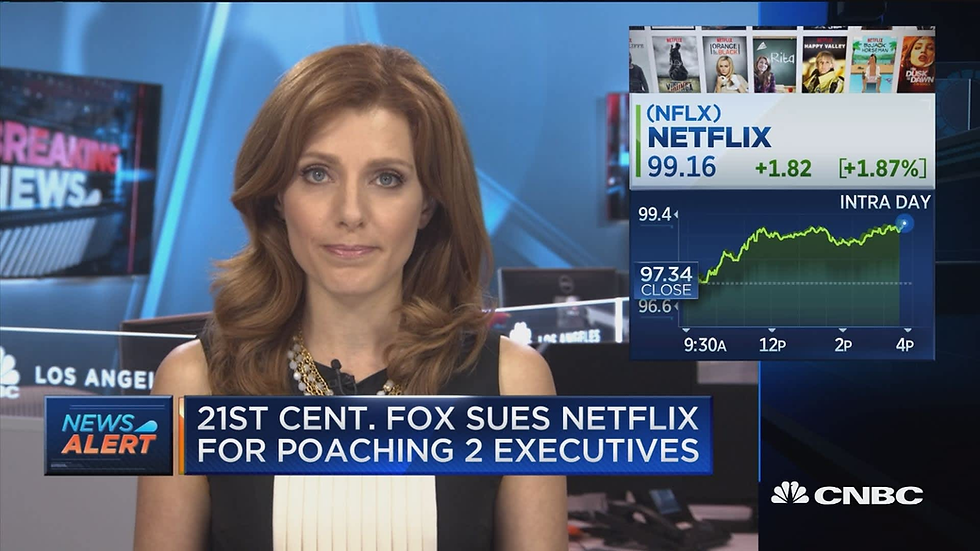The modern-day hunting grounds
A business’s success is most easily measured by the use of its brand name. And with the rise of OTT platforms Netflix has become synonymous with all our TV needs (and a bit more). But its growth has often involved dubious business practices, which landed it into legal backwaters, most notably with 20th Century Fox. So, what are these ‘nefarious business strategies?’

Why did Fox sue Netflix?
In 2016, Fox sued Netflix for poaching away mid level employees. Netflix hired Marcos Waltenberg, 20th Century Fox’s vice president of promotions at a doubled salary. A few months later, Netflix hired Tara Flynn, an executive at Fox21, also doubling her salary, instigating them to leave the company, breaking fixed-term contracts.
In its complaint, Fox asserted three causes of action against Netflix:
for tortious interference with Waltenberg’s fixed-term employment agreement,
tortious interference with Flynn’s fixed-term employment agreement, and
unfair competition in violation of Business and Professions Code.
A state trial court in Los Angeles granted an injunction blocking Netflix from soliciting Fox employees on fixed-term employment agreements or inducing them to breach their agreements.
Netflix countersued, arguing that the contracts were unenforceable. California law makes it illegal to hold an employee under contract longer than seven years. Netflix argued that Fox coerced its employees into extending its contracts in mid-term, effectively holding employees longer than the seven-year limit. Netflix Inc. lost its challenge to an order that the streaming giant stop poaching fixed-term employees from Twentieth Century Fox, after a California appellate court upheld the injunction on Thursday.
The California Supreme Court has observed that there are public policy benefits to fixed-term contracts, and other provisions, including a confidentiality provision and a non-solicitation provision, do not violate public policy, but provide “stability and predictability” for employees.
Netflix continues to highlight that such contracts unfairly restrict employee mobility, being painted as akin to indentured labour. Netflix’s argument, had it succeeded, could have upended how Hollywood studios do business.

What is poaching?
Poaching is a practice where a company recruits employees from a rival organisation, often with increased benefits. This is particularly prevalent in up-and-coming industries, where skill is highly valued and in short demand, such as the entertainment industry etc.

The negative connotation of the term employee poaching may make it appear that this practice is illegal, but it is actually legal and has several benefits for both the employers and the employees.
For employees, the competition results in better career opportunities and for employers, they get to hire talented employees, who do not need any training and bring in the necessary skills. However, its moral ambiguity can often lead to suits and damaged payments.
Regarding the potential for legal issues, although the practice itself is not illegal, there could be several instances where litigation may arise. First, it can be used as a way to monopolize the market by eliminating businesses or threatening their ability to compete. The second problem arises, if the new recruit possesses any proprietary information or ‘trade secrets.’ The information gathered by employees in the past can become the source of many disputes.
Netflix’s first encounter with the law?

What is more unnerving is the fact that Fox is not the only one to land Netflix in suits. Viacom also sued Netflix for poaching an employee in October 2018, a case it inadvertently won.

The ruling came a year after Netflix was ordered to stop poaching employees from Fox. If that was not enough, it was hit by a third lawsuit from Activision Blizzard, a video game publisher, for poaching its former CFO.
Hollywood and the poaching scandal
This case caused quite a controversy because Netflix was challenging not only Fox but the entire Hollywood establishment of fixed-term deals across California.
The case attracted the interest of SAG-AFTRA, which warned this dispute could make an impact beyond executives as employers in the entertainment industry often employ a catch and hold tactic, making fixed term agreements commonplace.
Although the recent Court of Appeal decision is unpublished, it presumably sends a strong message to those who would poach the employees of a competitor who are subject to fixed-term employment agreements.
Conclusion
Netflix’s business model, though used by many, is certainly losing its appeal, and even liberal labour laws are trying to reduce poaching. As the world faces a great resignation, retaining talent proves increasingly difficult, and ‘stability and predictability’ are more attractive than ever before. Businesses may want to re-evaluate the relative merits and risks of fixed-term vs. other arrangements, particularly for high-level employees.
~ Devangi Sharma
Sources: Bloomberg Law, Variety, Trade Secrets Law, Reuters
The case is Viacom International Inc. v. Netflix Inc., 18ST CV 00496, California Superior Court (Los Angeles).
The case is Twentieth Century Fox Film Corp. v. Netflix, Cal. Ct. App., 2d Dist., No. B304022, unpublished 12/2/21.

Comentários